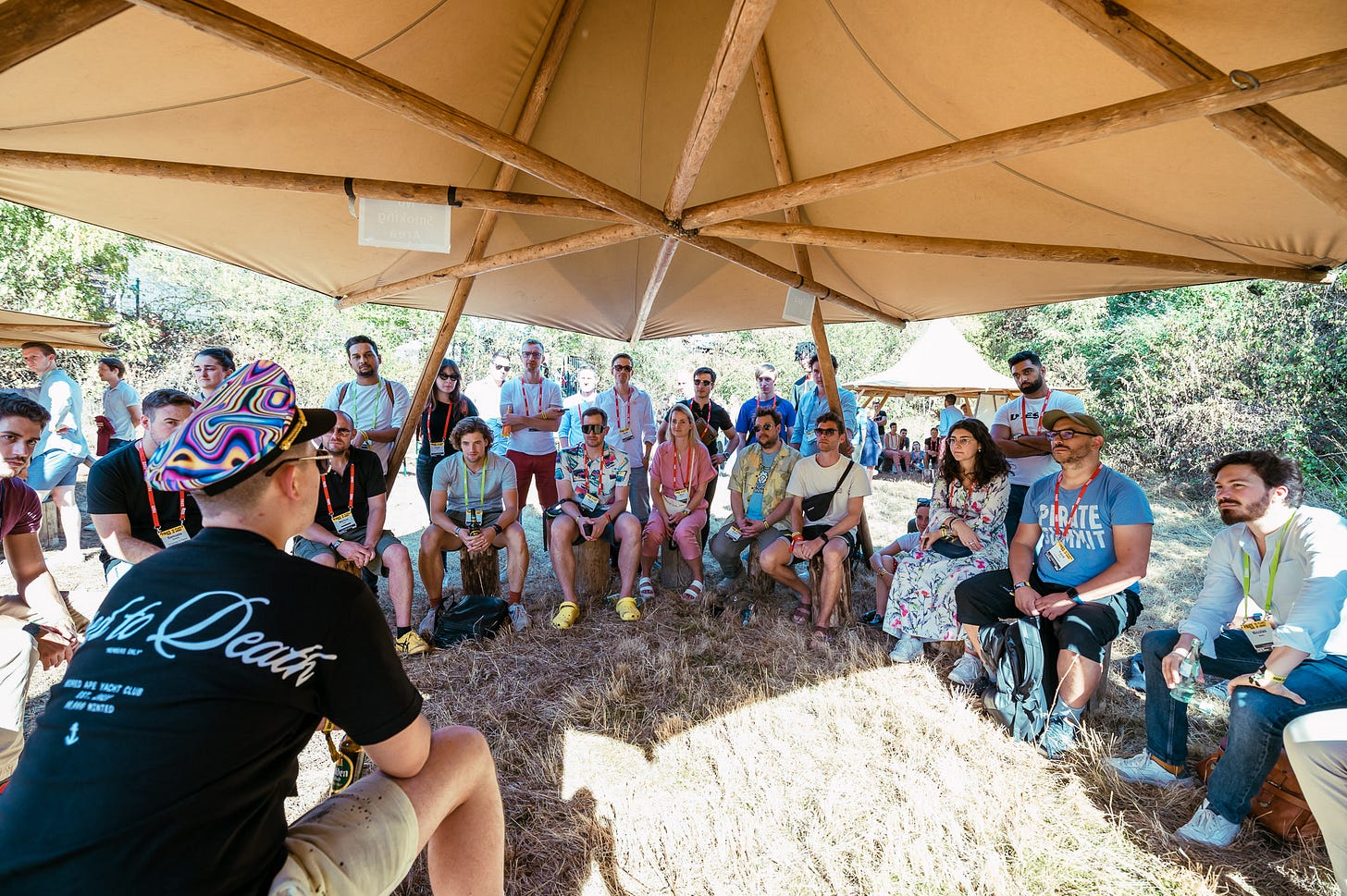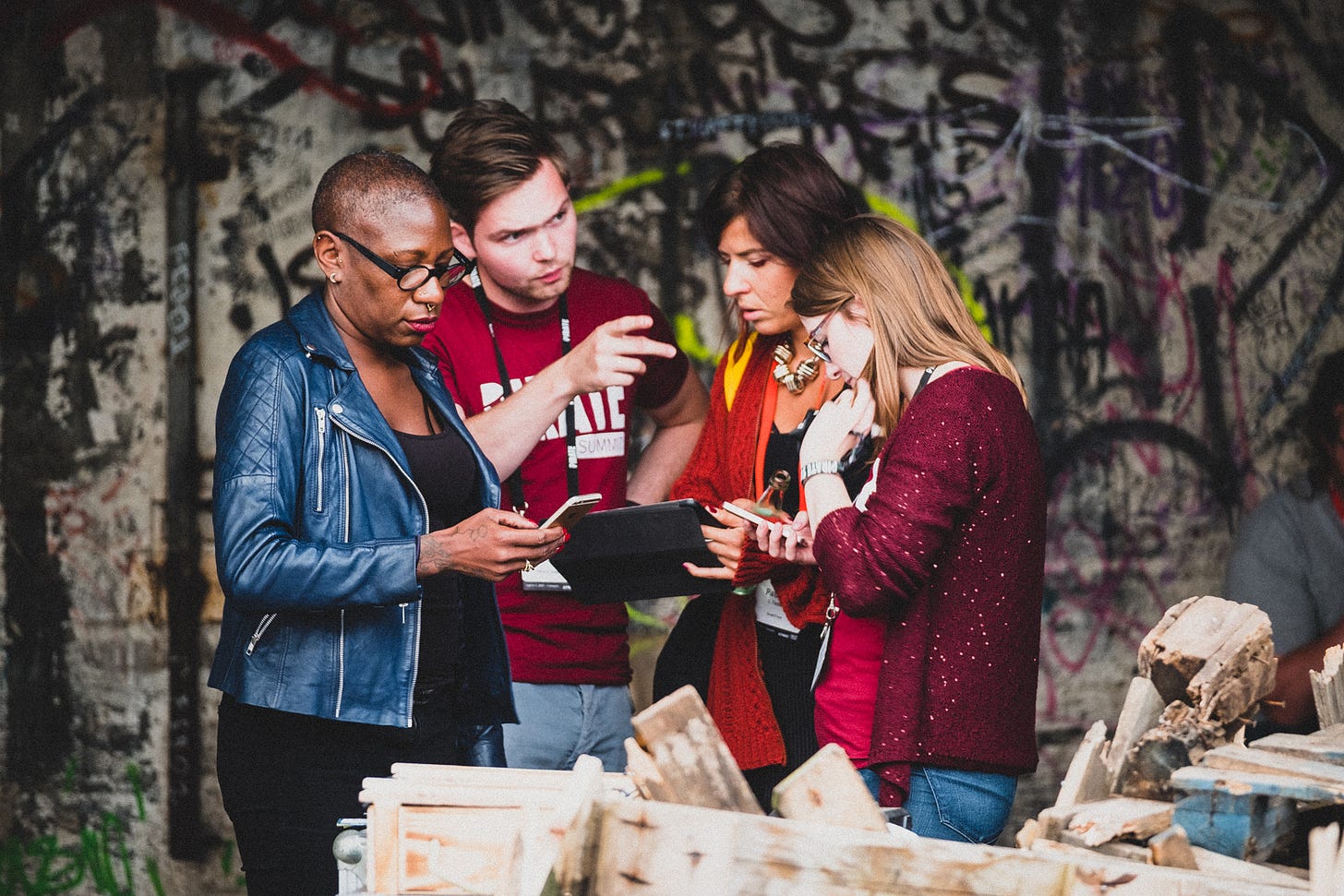“Why Do I Need to Learn This?"
On curiosity, usefulness, and why learning is the most human thing we do.
My son looked up from his school assignment last week and asked me a question I wasn't fully prepared for:
“Why learn all this when AI can just do it for us?”
It wasn't defiance - it was genuine curiosity. And I realized I needed a better answer than “because the teacher said so.” Not just for him, but for myself too.
In a world where information is instant and AI seems to know everything, what's the point of the struggle to learn?
Before I share what I told him, a quick announcement:
🏴☠️
PIRATE Night is back!
Save the date: August 28th at our beloved Odonien.
The buzz has already started - with possible delegations from the Balkans, Belgium, and Sweden. It’s exciting, humbling, and a clear sign: people want this to happen.
We intend to organize a meaningful two day program for those travelling from abroad. But I can’t pull it off alone. The PIRATEx Crew will handle logistics, but we need support with: outreach, content curation, experiences.
If you’re up for helping - spreading the word, shaping the program, or bringing cool ideas - hit reply and let me know.
Let’s make this happen!
P.S. Website coming soon.
🏴☠️
Now, back to that question that's been rattling around in my head...
It's the same question I asked when I was sitting in an American high school, wondering why I needed to memorize all 50 states and their capitals.
It's the same thing I thought when I was asked to learn about edge cases in accounting during university.
And it's the same thing people still say today about compliance trainings, about the periodic table or other subjects they think they'll never use.
The phrasing changes, but the sentiment stays the same:
“If it doesn’t help me right now, why should I care?”
It’s a fair question. Especially in a world where we can Google any fact in seconds, translate anything with a click, and summarize an article with a chatbot.
So what’s the point of learning anything at all?
Why figure out how to fix a leaky faucet if you can just hire someone?
Why read up on political history if you’re not running for office?
Why learn to play an instrument if you’re not planning on becoming a musician?
These aren’t just questions about knowledge. They’re questions about value. And our assumptions about what makes something worth it.
Utility is Overrated
We’ve become obsessed with usefulness.
We want knowledge to be practical, skills to be monetizable, and time to be optimized. We see learning as a transaction, when it was meant to be a transformation.
If something doesn’t move the needle immediately, we tend to dismiss it.
But usefulness is just one way to measure value. And, ironically, it’s often the most short-sighted one.
We confuse "useful" with "valuable." We mistake "convenient" for "meaningful." We aim for "efficient," and miss "transformative."
Some things only reveal their worth later. And sometimes, what seems useless today turns out to be foundational tomorrow.
Learning is Planting in Unpredictable Soil
I've come to see learning as a kind of slow, stubborn gardening.
You plant seeds in soil you don't control. Some grow. Some don't. Some lie dormant for years before breaking the surface.
That accounting class you barely passed? Might become essential when you're building a business.
That history unit you forgot about? Might click into place when you're analyzing why a movement, market, or mindset took root.
You don't always know what will grow. But not planting at all? That guarantees nothing ever will.
And just as becoming skilled at gardening has merit beyond any single harvest, the process of learning itself builds something valuable in you - regardless of which specific knowledge takes root.
It's About Building Mental Capacity, Not Just Knowledge
Most of what we learn won't be applied directly in the way it was taught. But that doesn't make it wasted effort.
Because learning is about more than what you know.
Learning builds cognitive resilience. It’s mental strength training.
It stretches the mind. Trains attention. Builds tolerance for ambiguity and frustration.
It teaches you how to ask better questions.
It strengthens your ability to connect dots that don’t obviously belong together.
This capacity-building is what prepares us for challenges we can't yet imagine. It develops our ability to wrestle with uncertainty.
It's what allows us to pivot when necessary, to innovate when stuck, to stay patient with complexity, to remain open when something doesn't make sense yet.
In the Age of AI, What Makes Us Human Is How We Learn
A machine can process more information in a second than we can in a lifetime. But it doesn’t care about that information.
It doesn’t get curious. It doesn’t play with ideas. It doesn’t feel wonder.
We do.
In a world where factual knowledge is increasingly commoditized, our human advantage isn't in knowing things – it's in how we approach not knowing.
What actually matters isn’t having the answers - it’s knowing how to look at them differently.
Creativity, insight, and wisdom don’t come from information alone.
They come from connection, context, and lived experience.
You can’t automate intuition. You can’t outsource imagination.
So, What Do You Tell Someone Who Asks, “Why Learn This?”
Tell them this:
Because it makes you adaptable.
Because it teaches you to stay curious, when others have moved on.
Because it makes your mind stronger, not just smarter.
Because it teaches you how to stay in the ring when things get hard.
Because it helps you find meaning, not just answers.
Because you never know when today's "useless" knowledge becomes tomorrow's insight.
Because learning - even when it's inconvenient or unclear - is an act of growth.
Because sometimes, doing hard things for no obvious reason is how you build character - and future possibilities.
Because you learn to learn.
And if that still feels like too much?
Then just say this:
“Because it builds the version of you that can handle what comes next.”
We’re not search engines.
We’re not algorithms.
We’re meaning-makers.
Let’s stop asking, “What’s the point of learning this?”
And start asking, “Who am I becoming as I learn it?”
Be kind. 🙏
Manuel





You amazingly outlined the indirect utility of learning. Super critical in an AI world
However i am missing a point
Nature build any creature in a way that everything that is not used , everything that is not learning (even your muscles are learning when used) will decay.
Nature build in a genuine motivator: learning produces dopamine and is fun itself. Play is fun because of microlearning momemts. Surprises are fun because of a microlearning moment.
Lets go back and understand learning as a form of play and embrace it fully.